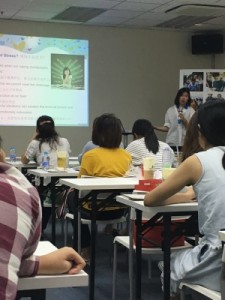 On Saturday, August 19, LIH Olivia’s Place Assistant Psychologist Ms. Helen Gu presented to teenagers of the Shanghai Sunrise program on Stress Management.
On Saturday, August 19, LIH Olivia’s Place Assistant Psychologist Ms. Helen Gu presented to teenagers of the Shanghai Sunrise program on Stress Management.
In China, children’s education is publicly funded until the age of 15. For children to continue their education, the student’s family must pay for the last three years of high school. This means that if families are not able to afford to pay for these school years, the children are left without completing a high school education. This can leave many children feeling without hope or a plan.
Shanghai Sunrise was founded in 1996, and is an organization dedicated to breaking the cycle of poverty by intervening within these families. Shanghai Sunrise raises funds for educational scholarships and with the help of more than 1,000 sponsors worldwide, they have raised over 28 million RMB. This has created almost 11,000 high school and university scholarships and helped over 2,500 students and their families.
LIH Olivia’s Place has begun a collaboration with Shanghai Sunrise to provide additional support to these students. Following a meeting between the two organizations over the summer, additional needs of these students were identified. These included assistance with coping with stress, mental health concerns, social difficulties, academic pressure, and concern about the future. LIH Olivia’s Place is committed to improving the lives of children across China, and a partnership with Shanghai Sunrise offers an opportunity for this.
Shanghai Sunrise conducted a “Career Training Day” with the aim of helping prepare these students for their future jobs and roles in the working world. Ms. Gu presented on Stress Management. This presentation introduced the topics of “good stress” and “bad stress,” and a discussion of how to identify when bad stress is becoming too much. Sources of bad stress were covered, including academics, social pressures, and schedules. Tips for addressing bad stress were also offered, and what to do when it became too much.
Ms. Gu was joined by Dr. Beth Rutkowski, Clinical Psychology Lead (Consultant), for a question and answer session following this presentation. The attendees asked a wide range of questions about planning for the future, how to deal with negative peer interactions, coping with pressure from society, and many other topics. This event expected to be the first of many collaborations between LIH Olivia’s Place and Shanghai Sunrise.






